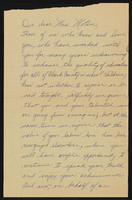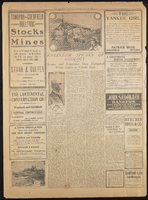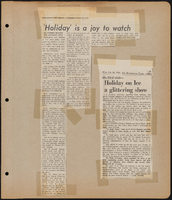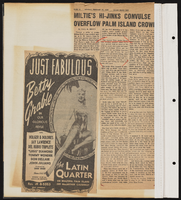Search the Special Collections and Archives Portal
Search Results
Junior League of Las Vegas Records
Identifier
Abstract
The Junior League of Las Vegas Records (1940-2023) contain annual reports, fundraising information, training manuals, articles, minutes, photographs, scrapbooks, cookbooks, and other operational and working files that document the activities of the Junior League of Las Vegas (JLLV). Also included is documentation for advocacy projects the JLLV was involved with, such as Drug Abuse Resistance Education (D.A.R.E.), Safe Haven, the Ronald McDonald House, Read Aloud, and Literature Awareness Program for Children. Other records in this collection document JLLV's fundraising efforts such as the Repeat Boutique, Holiday Coffees, annual benefits, luncheons, and sales of their cookbooks. Also included are scrapbooks and issues of their newsletter
Archival Collection
MGM Mirage Corporation Records
Identifier
Abstract
The MGM Mirage Corporation Records date from 1970 to 2010 and consist of the records of the Las Vegas, Nevada based global entertainment company. The collection contains organizational records, employee newsletters, files about the MGM Mirage diversity and inclusion initiative, correspondence, reports on gambling addiction, gambling statistics, press clippings, and audiovisual materials. There are also photographs, photographic slides, and photographic negatives of performers, corporate executives, and MGM Mirage properties.
Archival Collection

Mabel Hoggard: educational correspondence
Date
Archival Collection
Description
Folder of materials from the Mabel Hoggard Papers (MS-00565) -- Educational work and legacy file. This folder contains correspondence to and from Mabel Hoggard related to her teaching career. Correspondents include the University of Nevada, Las Vegas; Oran K. Gragson; Attorney Harry H. Jones, OCD supervisor; Mabel Hoggard Elementary School; Clark County School District; Department of Education, and others.
Text

Interview with Fred Ray Huckabee, January 21, 2005
Date
Archival Collection
Description
Text

Interview with Bruce Lee Wilhelm, June 22, 2005
Date
Archival Collection
Description
Text

Interview with Robert William Mackenzie, January 1, 2005
Date
Archival Collection
Description
Text

Transcript of interview with Sandra Peña by Lada Mead and Stefani Evans, March 27, 2017
Date
Archival Collection
Description
Sandra Peña’s story begins in East Los Angeles, where she spent her first fifteen years with her parents (both from Michoacán, Mexico), and her younger sister. The father's managerial position at Master Products allowed the family to live rent-free in a company-owned house behind the main factory, because he collected the rents for the company's two other dwellings. In this interview, Peña recalls the family move to Porterville, in California's Central Valley, her return to Los Angeles at nineteen, and her work with Parson’s Dillingham, a contractor for the Metrolink rail system. She draws the link between the Los Angeles and Las Vegas construction communities by describing her husband's move to Las Vegas to find work; a chance Las Vegas encounter with a friend from Chino, California; her ability to gain employment in Las Vegas at Parson’s, a company that had joint ventured with Parson’s Dillingham, and her move from there to Richardson Construction, a local minority-owned company. As Peña says, "It's kind of all intermingled. Even if you go here and you go there, it's like everybody knows everybody." Throughout, Peña weaves her family story into the narrative as she describes her youth, the birth of her son, the illness and death of her father, and her family's participation in her current employment with Richardson. As she remembers the people, places, and events of her life, Peña speaks to the ways one woman of color built on her interstate construction connections and rose in a male-dominated industry.
Text



